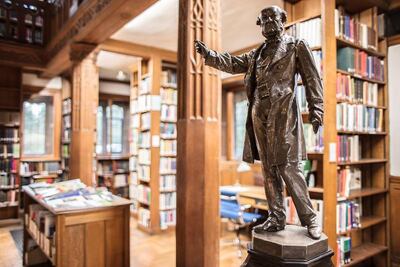William Gladstone, the revered 19th-century British prime minister who this week became a target of the Black Lives Matter movement, would not have objected to having his statues removed - if it were done by democratic process, his family said.
Gladstone, a Liberal statesman, emphasised equality of opportunity and free trade as leader of his country for 12 years in four terms between 1868 and 1894, and was opposed to slavery as a politician.
He has found himself on the hit list of the international human rights campaign because his father was a slave owner.
A statue of him in the grounds of Gladstone’s Library in Wales was included on the “Topple the Racists” list compiled by the Stop Trump Coalition in support of Black Lives Matter on Tuesday.
The interactive map was set up after a statue of Edward Colston, a 17th-century slave trader, was thrown into a river in Bristol on Sunday.
Its removal was part of protests over the death of African-American George Floyd, killed by a police officer in Minneapolis, which spread across the US and beyond.
Other historical figures among the 60 whose statues, plaques or monuments should be taken down so Britain can “finally face the truth about its past” include sea captain Sir Francis Drake, military leader Lord Kitchener and businessman Sir Cecil Rhodes.
The Gladstone entry on the Topple the Racists website says: “In William Gladstone’s maiden speech to Parliament, he defended slavery. He fought for compensation for slave owners.
"His father, John Gladstone, received the largest compensation payment of anyone in the UK, suggesting he owned the most slaves in the country at the time of abolition.”

But on Wednesday evening, Sir Charles Gladstone, the politician’s great-great-grandson, said in a surprising statement that he would not oppose the removal of William's statues if “it is the democratic will, after due process”.
“Nor, we think, would William Gladstone, who worked tirelessly on behalf of democratic change,” he said in a joint statement with the Gladstone’s Library warden, Peter Francis.
“Of course, it is undeniable that William Ewart Gladstone’s father, John Gladstone, in common with many successful British merchants in the early 19th century, owned land in the West Indies and South America that used slave labour.
“He received £106,769 in compensation at the time of the abolition of slavery. William himself received nothing.
"Yes, in 1831 William did speak in the Commons in favour of compensation for slave owners. It was his first speech in the Commons and he was still in thrall to his father."
By 1850, in Parliament, William Gladstone described slavery as ‘by far the foulest crime that taints the history of mankind in any Christian or pagan country’.
He had changed, they argued. Towards the end of his life, he cited the abolition of slavery as one of the great political issues in which the masses had been right and the classes had been wrong.
“He thought it was a taint on the national history and politics,” said Sir Charles, who rarely uses his title and prefers to be known as Charlie.
“His change was a move towards a profound commitment to liberty and perhaps this quote exemplifies his shift: ‘I was brought up to hate and fear liberty. I came to love it. That is the secret of my whole career.’
“Liberty today means countering racism, sexism and intolerance wherever we see it. That is where our energies should be exerted. That would be truly Gladstonian.”
Gladstone was born in Liverpool and died aged 88 in 1898 at Hawarden Castle, in Wales, where his heir, Charlie Gladstone, now lives with his wife Caroline.
He was buried at Westminster Abbey after a state funeral at which his coffin was carried by two pallbearers who would become future kings, Edward VII and George V.
The statement issued by Mr Gladstone and Mr Francis was in part written to address the agreement on Tuesday by the University of Liverpool to rename one of its halls of residence.
The decision came after a group of students called in an open letter to the vice-chancellor for the removal of the Gladstone name “due to his views on slavery”.
A university spokesman said that discussion around Gladstone Hall had been in progress for some time and that choosing an alternative name would be a democratic process.
"We share in the shame that our city feels because its prosperity was significantly based upon a slave economy,” the spokesman said.
But the move has proved divisive, prompting a backlash from some students, academic staff and local politicians who accused the university of trying to rewrite history.
Many took to social media to point to Gladstone’s achievements as a political reformer, saying that instead of erasing the past, signs should be used to put events into context.
Mr Gladstone and Mr Francis said they had not been contacted by the university recently but had read that the decision had been democratic.
What matters, they stressed, was how people live today, the values they hold, and their democratic process and political involvement.
Gladstone’s politics and values were strikingly different from those of his Tory father, the statement said. He was the first British politician to lead a left-leaning government and to institute dramatic democratic changes when he introduced the secret ballot, universal education and a foreign policy based on freedom and liberty, and not the aggrandisement of the Empire.
“So to us, the decision seems right and proper,” they said. “Gladstone stood for change and so do we.”






























